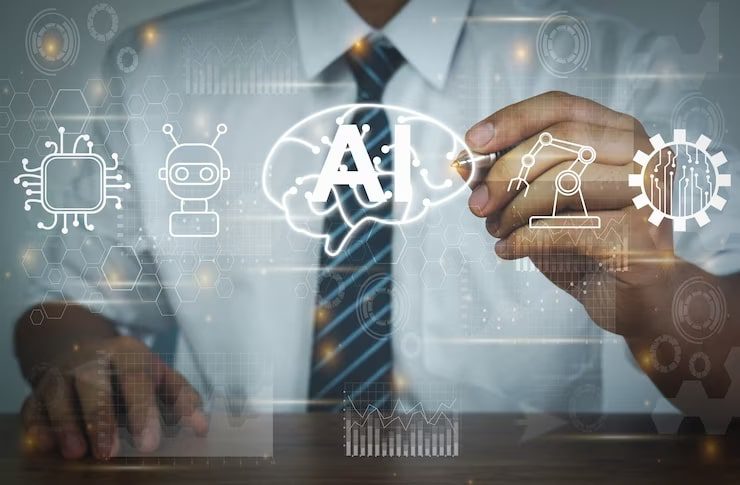The office drone of yesteryear, hunched over spreadsheets and battling endless paperwork, is fading into the sepia-toned realm of corporate history. Enter the age of Artificial Intelligence (AI) and machine learning, where automation is no longer a clunky mechanical arm, but a sleek, intelligent partner transforming the way businesses operate.
AI is not just the buzzword du jour; it’s a paradigm shift in business automation. It’s the brain behind the robotic hand, the data-driven maestro conducting the symphony of efficiency. Let’s delve into the orchestra pit and explore how AI in business automation works:
From Rule-Based to Intelligent Automation:
Traditional automation relied on rigid, pre-programmed rules, often struggling with nuanced situations and exceptions. AI, however, is a learning machine, constantly analyzing data and adapting its algorithms. Imagine a customer service bot that doesn’t just follow scripts, but understands the context of your query and provides personalized, empathetic support. That’s the power of AI-powered automation.
Speed Demon and Precision Perfectionist:
Repetitive tasks that once took hours or even days can now be completed in minutes with AI in business automation. Data entry, invoice processing, scheduling appointments – these mundane chores become mere blips on the radar as AI bots handle them with lightning speed and unmatched accuracy. It’s like having a tireless, error-free team working around the clock, freeing up your human workforce for more strategic pursuits.
Unleashing the Power of Data:
Businesses are sitting on mountains of data, but without the right tools, it’s like staring at a foreign language. AI is the Rosetta Stone, decoding patterns and insights ukryen within the data. It can predict customer churn, identify market trends, and optimize operations with unparalleled precision. Imagine a sales team that knows exactly which customers are most likely to convert, or a marketing campaign that targets the right audience with laser-like accuracy. That’s the magic of AI-powered data analysis.
The Human-AI Symphony:
AI isn’t here to replace humans, it’s here to augment them. The best automation is a collaboration, where human creativity and strategic thinking guide the AI’s powerful processing abilities. Imagine a team of engineers using AI in business automation to generate design prototypes, freeing them to focus on the innovative spark and aesthetic touch. It’s a partnership that leverages the strengths of both humans and machines, creating a force greater than the sum of its parts.
The Future is Now, and it’s AI-Powered:
The impact of AI on business automation is just the beginning. As technology evolves, we can expect even more groundbreaking applications. AI-powered chatbots that handle complex customer inquiries, process optimization, virtual assistants that manage your calendar and schedule meetings, and even AI-driven marketing campaigns that adapt to individual customer behavior in real-time – these are not futuristic fantasies, but the near future of business.
Navigating the AI Revolution:
While the benefits of AI are undeniable, embracing this technological tsunami requires careful consideration:
- Investing in the right AI tools: Not all AI solutions are created equal. Choose tools that align with your specific needs and data infrastructure.
- Understanding AI’s Impact: Recognizing the potential benefits and challenges AI in business automation brings, such as increased efficiency, automation of tasks, and ethical considerations, is crucial. Businesses and individuals need to stay informed about the evolving landscape of AI to make informed decisions and harness its transformative potential.
- Preparing your workforce: The transition to AI can be unsettling. Invest in training programs to equip your employees with the skills needed to thrive in this new landscape.
- Skills Development and Adaptability: With AI rapidly changing the employment landscape, individuals must focus on acquiring and enhancing skills that complement and work alongside AI technologies. This involves cultivating skills such as critical thinking, creativity, and emotional intelligence, which AI currently lacks.
- Prioritizing ethical considerations: AI algorithms can be biased, leading to unfair or discriminatory outcomes. Ensure your AI implementation adheres to ethical principles and promotes responsible data usage.
Conclusion
The future of business automation is not a pre-programmed script; it’s an open-ended symphony where AI and humans collaborate to create a masterpiece of efficiency, innovation, and success. Embrace AI in the business automation revolution, learn its language, and become the conductor of your own business transformation. Remember, the future belongs to those who adapt, and with AI as your guide, you’ll be composing a symphony of success that will resonate for years to come.







